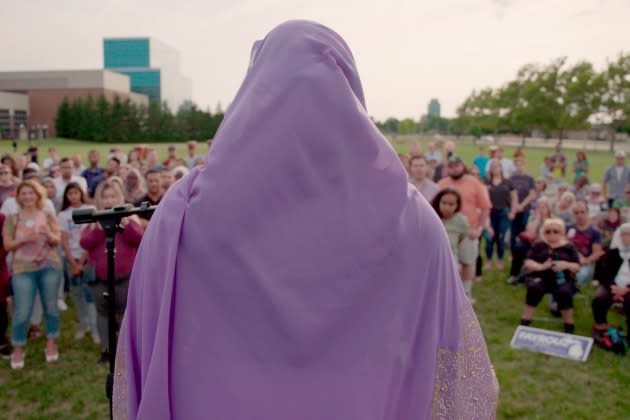‘An Act of Worship’ Review: Personal Stories Take Precedence in Documentary on Muslims Fighting Bias in America

Though the term “Islamophobia” may seem of relatively recent vernacular vintage, such sentiments have been aggressively popularized — and politicized — for over three decades in the American consciousness. Nausheen Dadabhoy’s “An Act of Worship” chronicles that trend and its impact on Muslims in the U.S., while focusing on several individual activists combatting related discrimination, hate crimes and related woes.
This Tribeca-premiering documentary provides a gracefully crafted, persuasive portrait of communities demonized for the acts of an extremist (and mostly overseas) minority with whom they share a religious identity, but little ideology. Those looking for more insight into those ideological differences, or an informative general introduction to our nation’s Muslim populations, may be frustrated by “Worship’s” near-exclusive emphasis on personal stories. Its PSA-like tenor will, however, nicely fit the bill for broadcasters seeking accessible content affirming values of diversity and tolerance.
More from Variety
'Body Parts' Acquired by MetFilm Sales Ahead of Tribeca Premiere (EXCLUSIVE)
'Corner Office' Review: Jon Hamm Switches Jobs, Playing a Dull Desk Jockey in This Indie Oddity
The Pakistani American director bookends her sophomore feature (following 2015’s “The Ground Beneath Their Feet”) with glimpses of a workshop in which attendees are asked to write down incidents of discomfort or outright harm they’ve experienced as Muslims. Soon Post-it notes cover an entire wall, encompassing everything from schoolyard bullying to suicidal ideations after 9/11. We then get more detailed insights from myriad voices (often unidentified interviewees on the soundtrack), as Dadabhoy weaves in archival footage illustrating larger events that directly or indirectly affected the course of those lives.
The Immigration and Nationality Act of 1952 abolished prior race-based restrictions, permitting a wave of expats from Africa, South America and Asia, seeking a better life in the States. Among them were a significant number of Muslims, though as one person says here, most soon learned to “keep their religion and culture hidden” to fit in. But a series of high-profile events conspired against their attempts to lay low, even if those incidents seldom had any real connection to their communities.
One was the Iran hostage crisis (dramatized in “Argo”) that began in late 1979 and lasted 444 days. In 1991, the Gulf War again stirred anti-Arab bigotry, with grade-schoolers taunted as “Saddam Hussein’s children.” The Oklahoma City bombing four years later turned out to have been perpetrated by homegrown white supremacists. But in its immediate wake, many (including law enforcement officials) assumed “Islamic fundamentalists” were likely the culprits.
Needless to say, “Muslim = terrorist” rhetoric went through the roof after 9/11, the subsequent Patriot Act placing a governmental stamp of approval on suspicion and intimidation directed toward Muslim residents for any flimsy reason. Many in their communities were dismayed by assumed ally President Obama’s continued military aggression in the Middle East. But the homefront climate would get considerably worse under Trump, one of whose angry MAGA acolytes is seen here screaming, “Every Muslim is a terrorist,” while literally stomping on a Qu’ran.
These global and national events (also including the 2015 Boston Marathon bombing) had a palpable street-level effect on U.S. Muslims, who found themselves open targets for slurs and sometimes violence. Wearing a hijab became perilous; mosques were vandalized or burned. For some, the Trump era’s select travel bans separated them from family members for years on end.
Such has been the only sociopolitical environ experienced by American Muslims born after 9/11, or too late to remember life before it. Theirs is an interesting perspective, as articulated by the three young female activists given most screen time here: Sudanese-born, Michigan-settled Khadega, a performance poet; NYC community organizer Aber, whose Palestinian father was deported for purportedly selling out-of-state cigarettes when she was a teen; and Ameena, a California civil rights lawyer. All of them have intriguing personal stories and inspiring zeal, as well as family members who don’t entirely approve of their busy public lives.
“An Act of Worship” is very well assembled, with editor Ben Garchar smoothly orchestrating a mix of news, archival, home-movie, verite and interview footage that casts a wide geographic net in smartly paced form. Mary Kouyoumdijian’s spectral score underlines the poignancy of of ordinary citizens whose culture and religion date back nearly as far as Christianity (with which it has significant overlaps), but who are commonly lumped in with extremist sects in countries few of them have ever been to.
The average American’s ignorance on these matters is profound, though “Act of Worship” isn’t out to educate viewers for whom Islam is an “exotic” unknown at best and a realm of “evildoers” at worst. The focus on individual viewpoints excludes any neutral intel on the overall size, location density and diversity of U.S. Muslim populations, their differences in religious belief, or just how those beliefs fall very far from “terrorist” stereotype. That may be a job for a different film. By the end of this one — which features a celebratory montage and poetic recitation — it has become more an exercise in self-affirmation than outreach.
Best of Variety
Sign up for Variety’s Newsletter. For the latest news, follow us on Facebook, Twitter, and Instagram.

